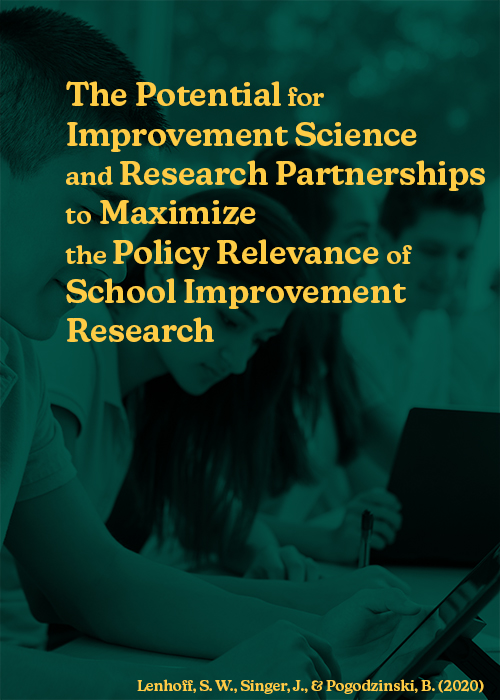Research
Check out our academic publications, policy reports, and working papers. Browse all of our work, or search by topic or type.
Page 1 of 3
The Role of School- Based Transportation in School Choice: Evidence from Detroit
In school choice systems, many families face geographic constraints. Yet, there is limited evidence on the association between school-based transportation and students’ school choice, especially in fragmented transportation contexts. Using unique data on Detroit kindergarten students’ eligibility and access to school-based transportation, we find that students with access to a bus at a school—either a traditional or shuttle-style bus—were 4-5 percentage points more likely to enroll in that school. The association was greater for traditional buses in higher-crime neighborhoods and for shuttle-style buses for farther-away choices. We did not find that this association differed by block-group-level household car ownership. Our findings suggest that school-based transportation can increase school choice access, depending on policy design and contextual factors. This report was co-published with the National Center for Research on Education Access and Choice (REACH).
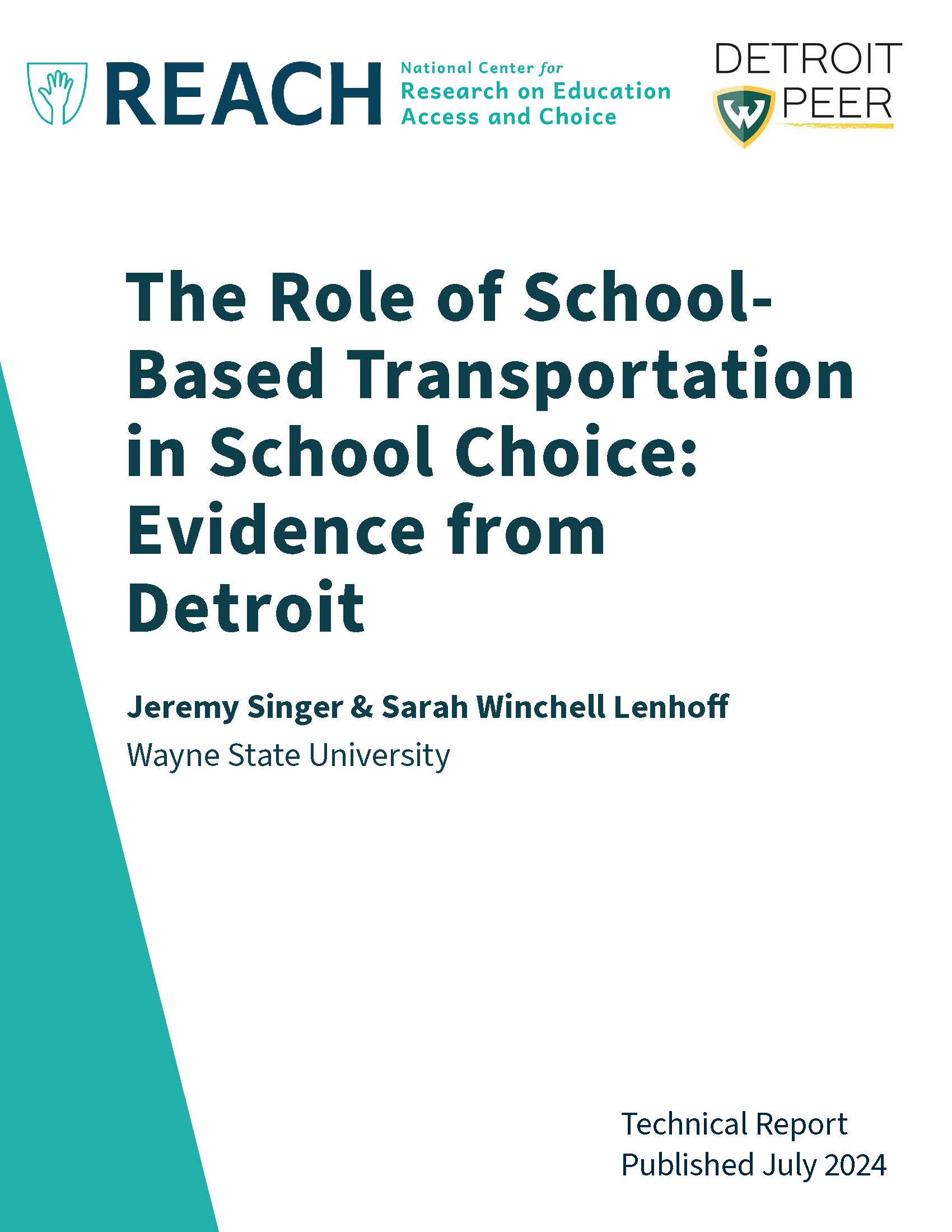
Detroit’s Educational Outcomes and Opportunities Across Race and Gender
Contemporary education policy is dominated by narrow representations of student data, resulting in a limited understanding of school inequalities. This study aims to show how educational outcomes and opportunities are differentially experienced when race and gender are simultaneously accounted for in Detroit. Analyzing educational outcomes and opportunities for students who live in Detroit, we examine differences by race and gender in areas such as math and reading achievement, high school graduation, chronic absenteeism, access to advanced coursework in high school, and special education.
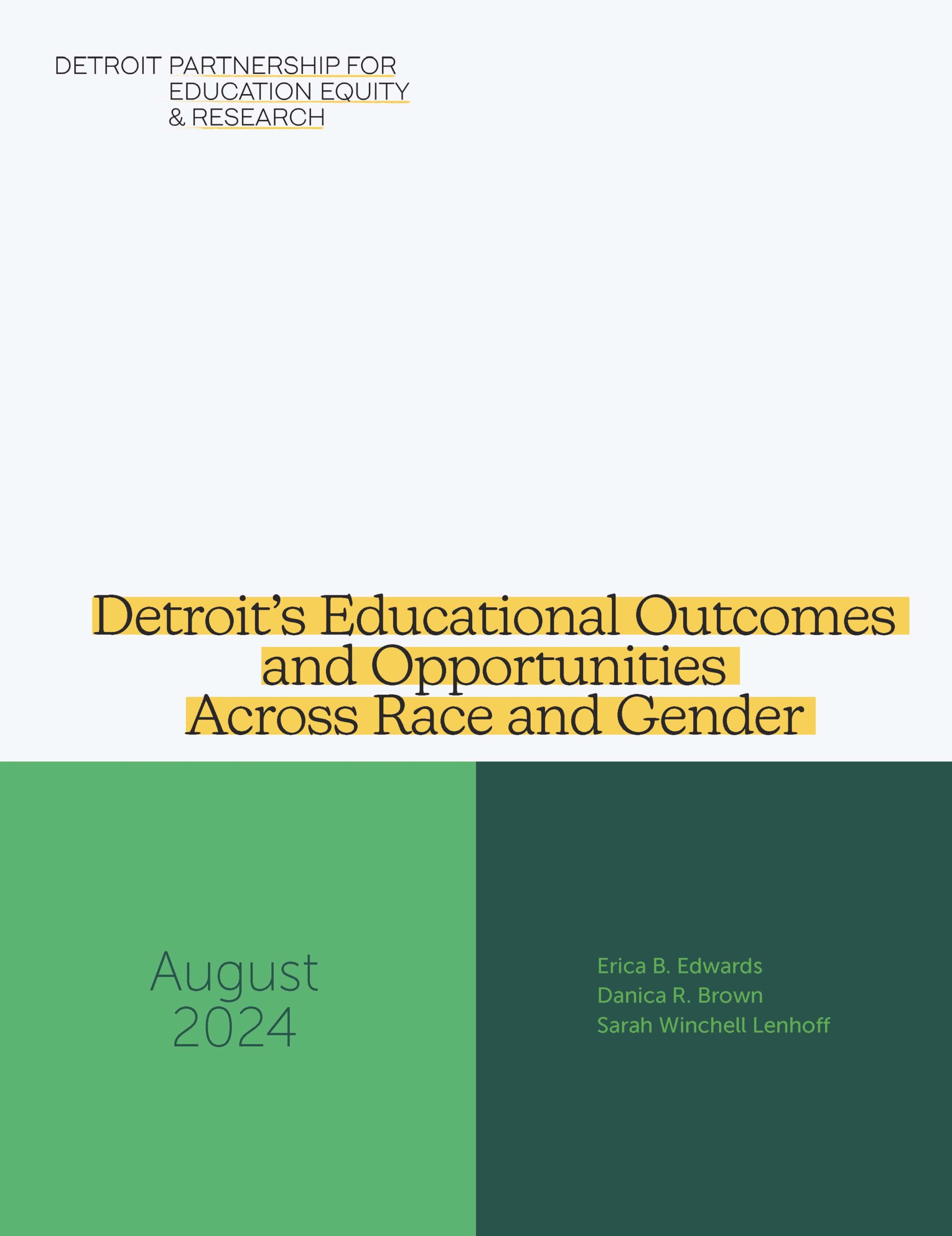
Chronic Absenteeism in the School-Prison Nexus
This qualitative case study examines how attendance management practices are designed and implemented in a large urban school district and explores the empirical and conceptual relationship between student behavior and attendance management within the “school-prison nexus.” We use interviews with parents, high school students, and staff charged with reducing chronic absenteeism to demonstrate how managing students’ attendance through intervention plans, student monitoring, and threats of legal action have implicit and explicit parallels to the management of student behavior in schools and could be considered a potential mechanism through which the school-prison nexus functions. We conclude with implications for schools and districts as they seek ways to reduce chronic absenteeism without contributing to the over-surveillance and punishment of high school youth.
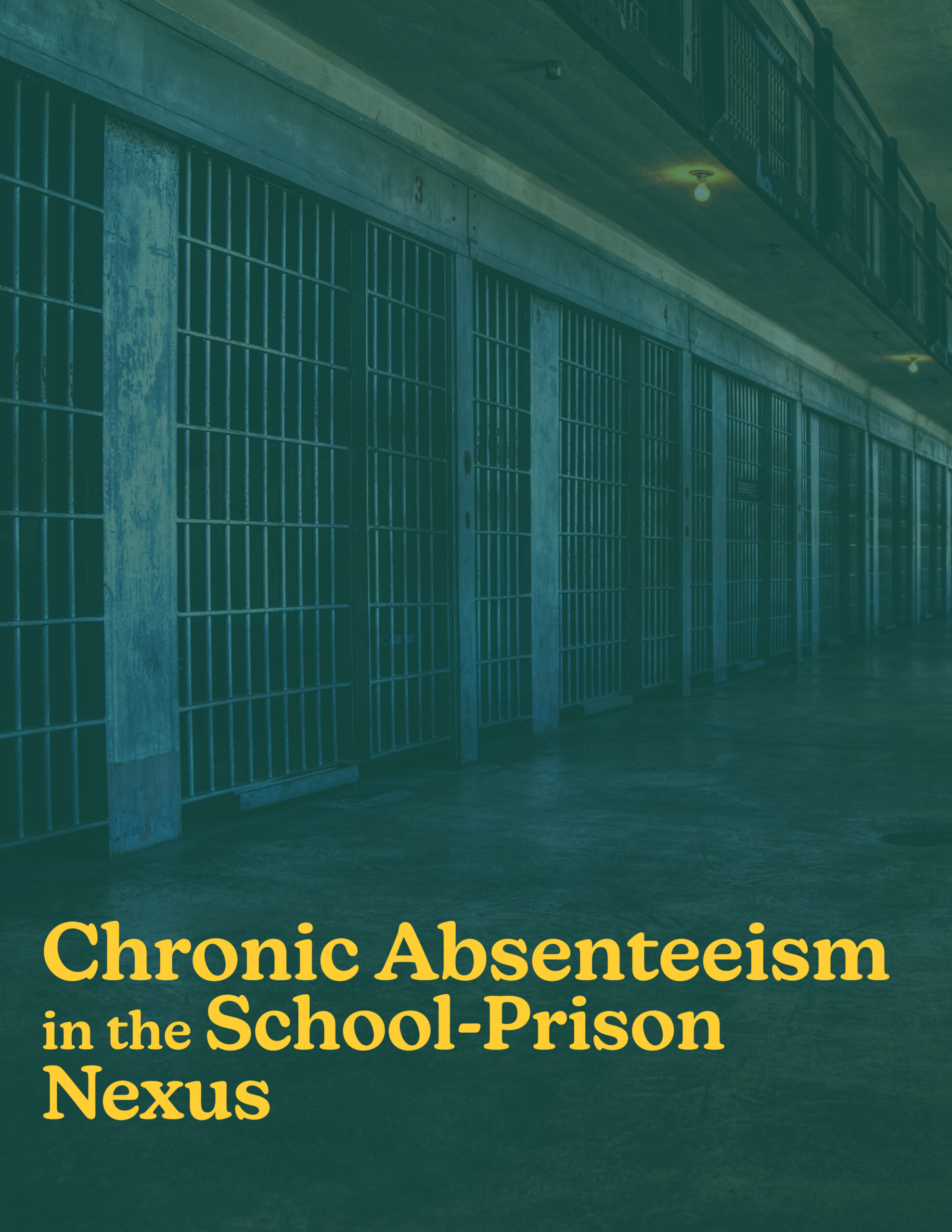
A Stable Place to Live and Learn: Why Detroit Housing Policy Is Critical to the Success of City Schools
This report was made in collaboration with Poverty Solutions at UM. It was created in order to better understand opportunities to address housing instability among Detroit’s families in a manner that meets the educational needs of children. This brief analyzes interviews with 20 parents identified as homeless or housing unstable and the responses of more than 1,400 Detroit parents who responded to a January 2022 survey conducted by Wayne State University’s Detroit Partnership for Education Equity & Research (Detroit PEER). Themes are discussed and policy recommendations based on innovations in other cities are presented.
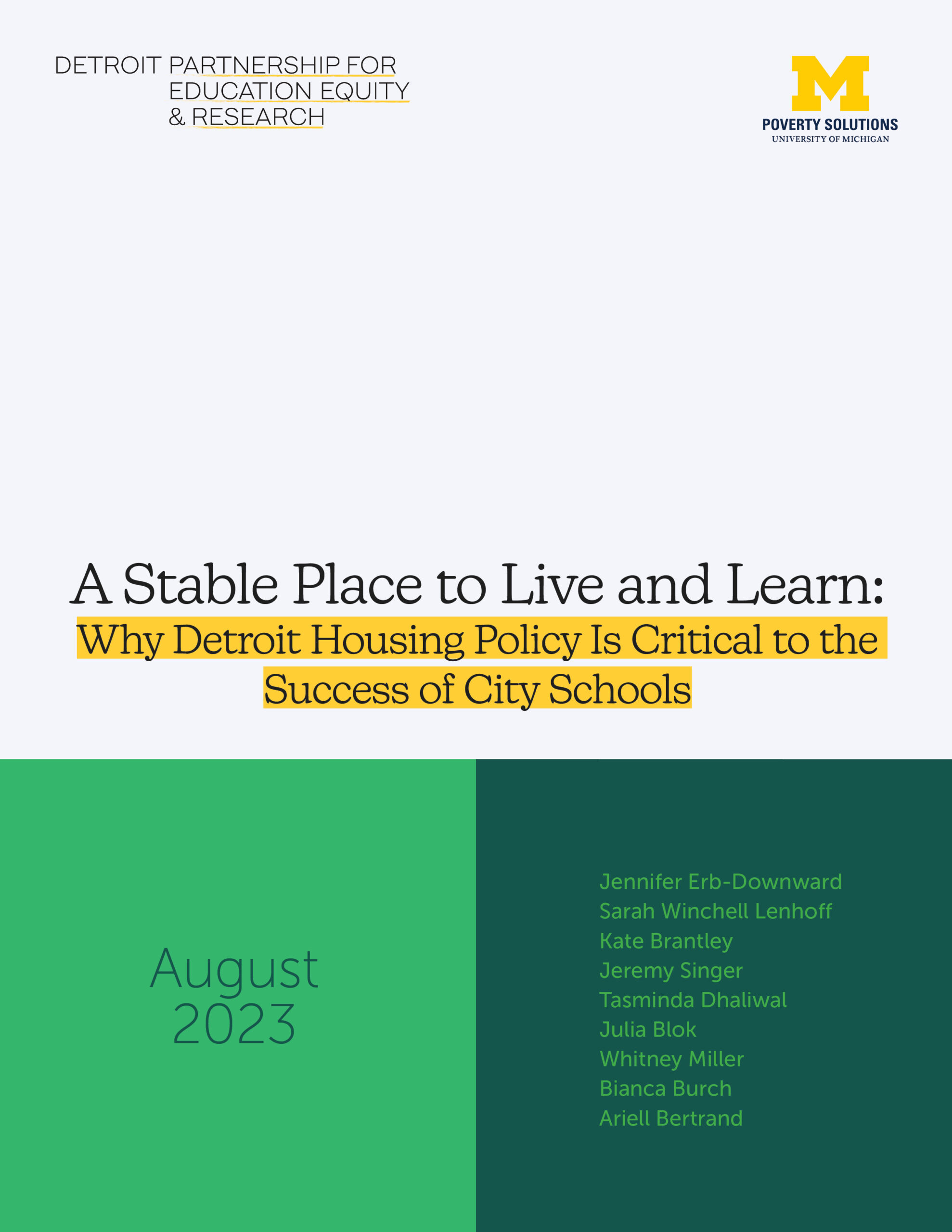
Gaps in Identification and Support for Students Experiencing Homelessness and Housing Instability in Detroit
Homelessness and housing instability can have significant negative effects on students’ academic and behavioral outcomes. Schools that endeavor to support students who are experiencing housing instability can only do so if they accurately identify students facing these challenges. This mixed-methods study provides deep, contextualized data on the experiences of housing unstable youth and families in Detroit traditional public and charter schools, whether and how they are identified as housing unstable by their districts, and what schools are doing to support them. We find that 16% of Detroit students were housing unstable in 2021-22, but Detroit schools only identified 4% of students as homeless under the McKinney-Vento Act. Our qualitative data suggest that this undercount is predominantly related to parents’ feelings of stigma and shame associated with discussing their situation with their schools and in some cases a lack of follow-through when parents do divulge their housing issue. Housing unstable students who were not identified by their districts as such were more likely to have been suspended; identification was not associated with attendance or student mobility, compared to other housing unstable students.
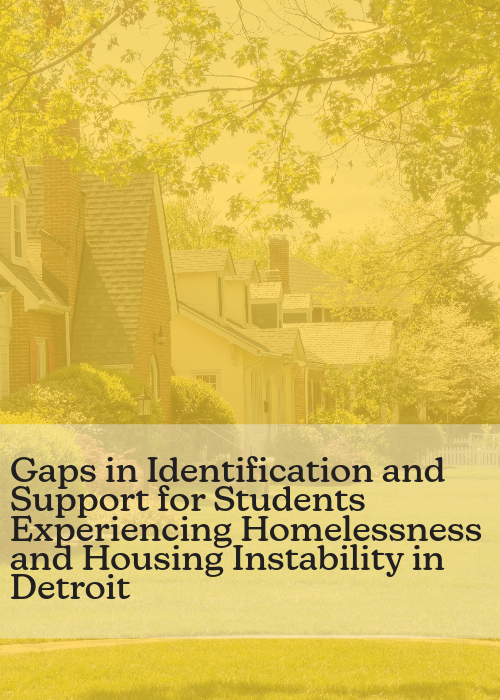
School Transportation Mode and Student Attendance Across Schools of Choice
The availability and reliability of school transportation is essential for regular student attendance at school. Yet, school transportation resources are stretched for both families and school districts in cities with widespread school choice, where students’ residences do not determine where they enroll in school. This study provides some of the first evidence on how Detroit students get to school. Going beyond eligibility for the school bus, we use linked survey and administrative data to determine how students get to school, the student and school characteristics associated with riding the school bus, and how mode of transit is associated with attendance.
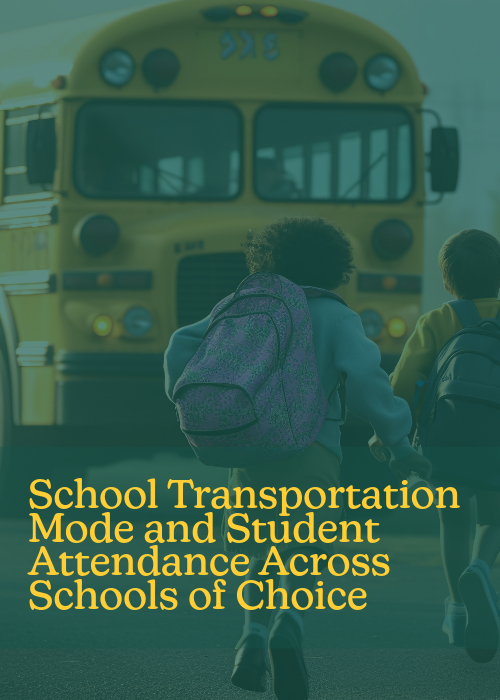
Detroit Schools Severely Under-Identify Students Experiencing Homelessness and Housing Instability
In this policy brief in partnership with Poverty Solutions at UM and MSU's College of Education, we provide clear evidence that Detroit schools under-identify students experiencing homelessness and housing instability, and we identify ways that schools and districts can improve identification.
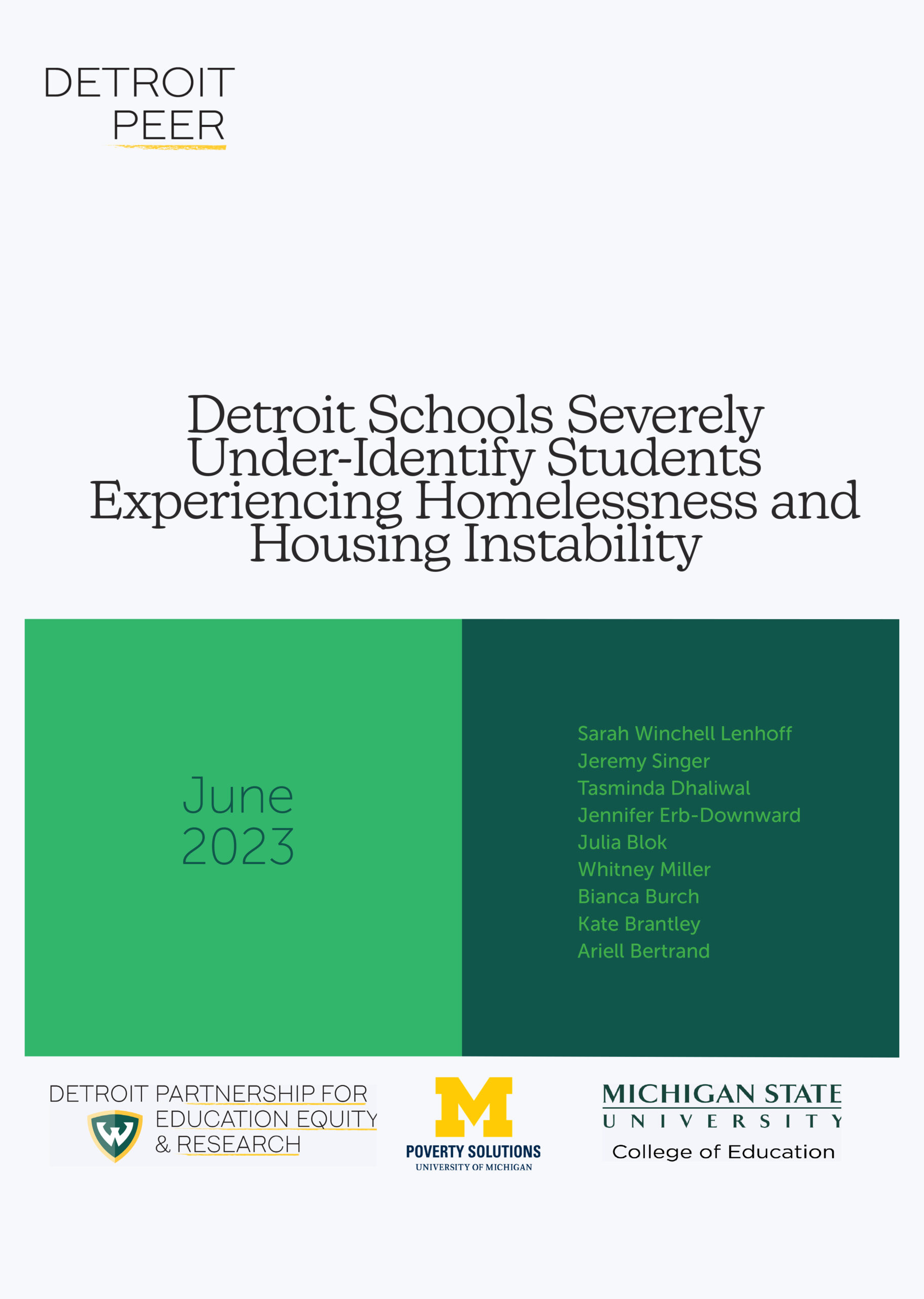
Detroit Parents’ Attitudes on COVID-19 Prevention Strategies in School
This report summarizes key findings from a representative survey of Detroit parents of K-12 students fielded in January 2022. By examining Detroit parents’ support for quarantine, masking, vaccine mandates, and remote learning policies in schools alongside specific pandemic-related hardships, we were able to identify the degree to which these barriers shaped a given household’s support for each policy. We hope this research informs the development of school health measures that will ensure equitable educational access as the pandemic continues into this school year.
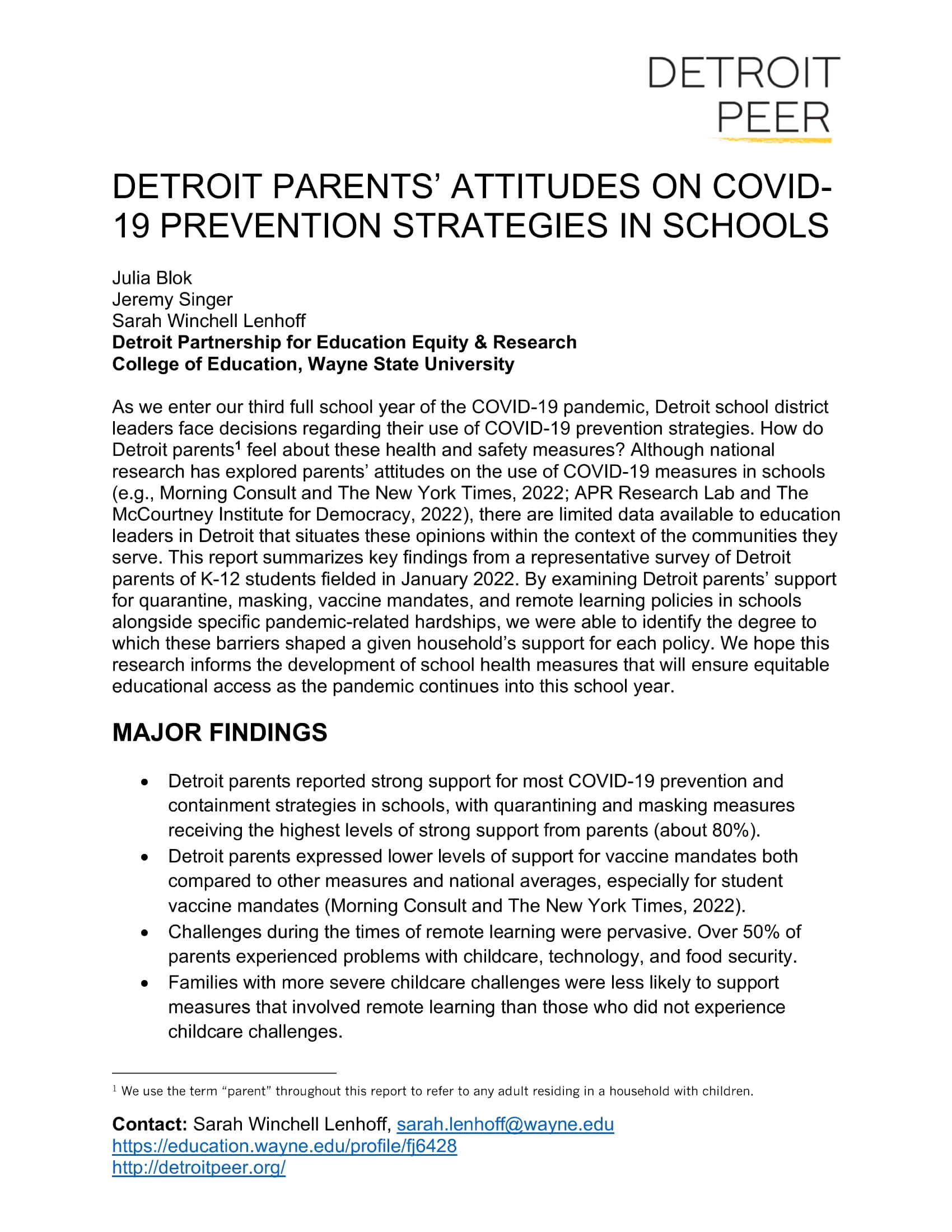
Beyond the Bus: Reconceptualizing School Transportation for Mobility Justice
This essay combines an ecological perspective with a mobility justice theoretical framework to reconceptualize the relationship between school transportation and educational access. Authors Sarah Winchell Lenhoff, Jeremy Singer, Kimberly Stokes, James Bear Mahowald, and Sahar Khawaja document the problem of “getting to school ”that is at the intersection of students’ family, community, and social contexts and how it goes beyond whether there is a reliable mode of physical transportation. Bringing together a historical analysis of the policy landscapeand interview data from parents and students in Detroit, they find that school transportation problems reflect the unequal political, social, and economic context in which families navigate enrollment and attendance. They discuss how policymakers can advance mobility justice in school policy by equitably distributing transportation resources, engaging students and parents as experts in developing and communicating transportation policy, and using institutional power to remedy structural barriers to educational access.
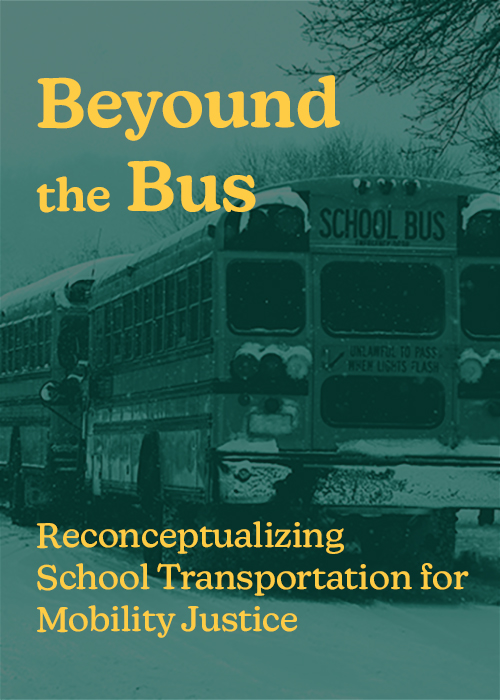
School Transit and Accessing Public School in Detroit
Students in the Detroit Public Community Schools District (DPSCD) have the highest rate of chronic absence (missing 10% or more of school days) among large districts in the United States. Additionally, students in DPSCD are among the poorest students in the country, often lacking access to reliable personal transportation or public transit to facilitate getting to school. Although DPSCD offers school-sponsored transit, only 30% of K-8 students were eligible for such transit in 2018-19. Through the use of multilevel modeling, we sought to identify the association between eligibility for school-sponsored transit and attendance. Our findings indicated that there was a negative association of small magnitude between eligibility for school sponsored transit and school attendance. This counterintuitive finding may highlight the fact that transit eligibility is not sufficient to mediate the negative relationship between student poverty and attendance, and transit eligibility does not guarantee regular use of school-sponsored transit.
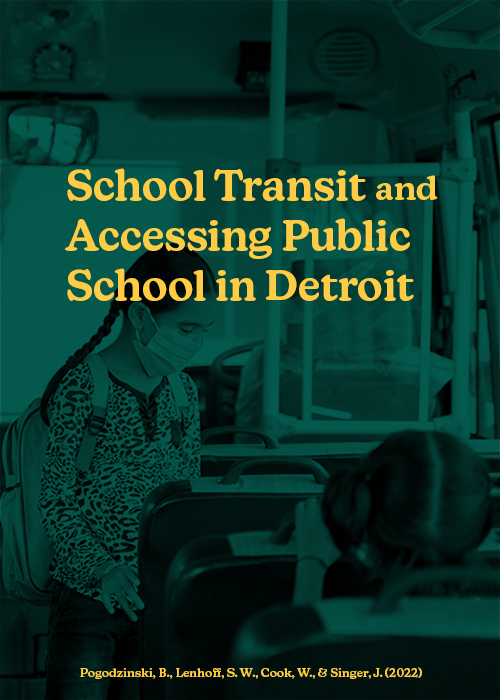
Promoting Ecological Approaches to Educational Issues: Evidence from a Partnership around Chronic Absenteeism in Detroit
Many problems that we conceptualize as “educational” have multiple causes that cut across students’ ecosystems. Yet, most education reforms are targeted narrowly at schools, educators, and students. Supporting educators and community leaders in conceptualizing educational problems from an ecological perspective and designing policies in alignment with that conceptualization is critical to improving student outcomes. This study documented the macro-, meso-, and micro-level institutional conditions that shaped how educators and community leaders conceived of the problem of absenteeism in response to research framed ecologically. Our findings highlight the challenges researchers may have in influencing ecosystemic policy solutions, but they also provide insight into potential pathways for doing so through research partnerships.
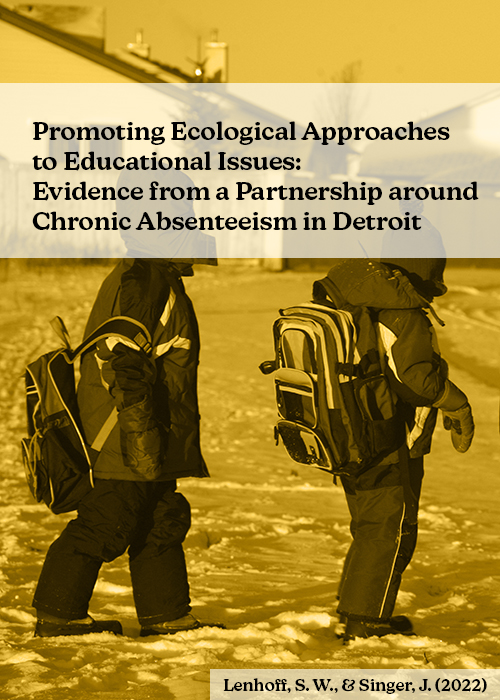
Race, geography, and school choice policy: A critical analysis of Detroit students’ suburban school choices
The purpose of this study is to advance our thinking about race and racism in geospatial analyses of school choice policy. To do so, we present a critical race spatial analysis of Detroit students’ suburban school choices. To frame our study, we describe the racial and spatial dynamics of school choice, drawing in particular on the concepts of opportunity hoarding and predatory landscapes. We find that Detroit students’ suburban school choices were circumscribed by racial geography and concentrated in just a handful of schools and districts. We also find notable differences between students in different racial groups. For all Detroit exiters, their schools were significantly more segregated and lower quality than those of their suburban peers. We propose future directions for research on families’ school choices as well as school and district behavior at the intersection of race, geography, and school choice policy.
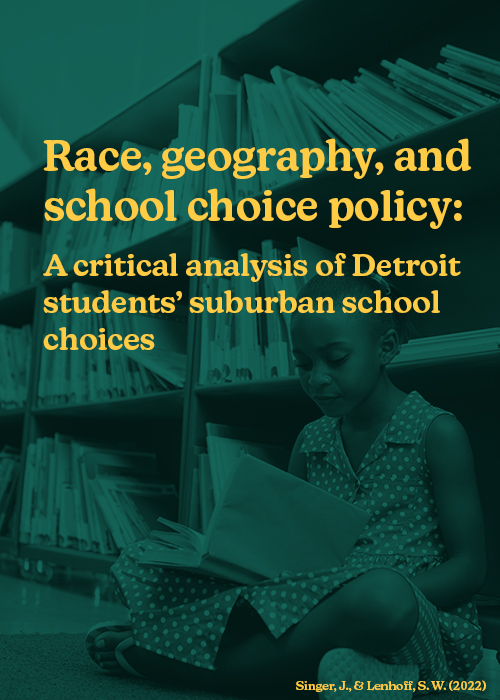
Detroit Families’ Experiences with COVID-19 and School Attendance
How much school students attend is a powerful indicator of their wellbeing and a strong predictor of their future success in school. During the first full school year of the COVID-19 pandemic (2020-21), most Detroit students attended school online and many experienced significant challenges at home and school. This research report summarizes the key findings from a representative survey of Detroit Public Schools Community District (DPSCD) families at the end of that school year. By linking survey responses to students’ attendance records, we were able to identify how experiences during the pandemic and socioeconomic circumstances in general shaped attendance during this critical school year.
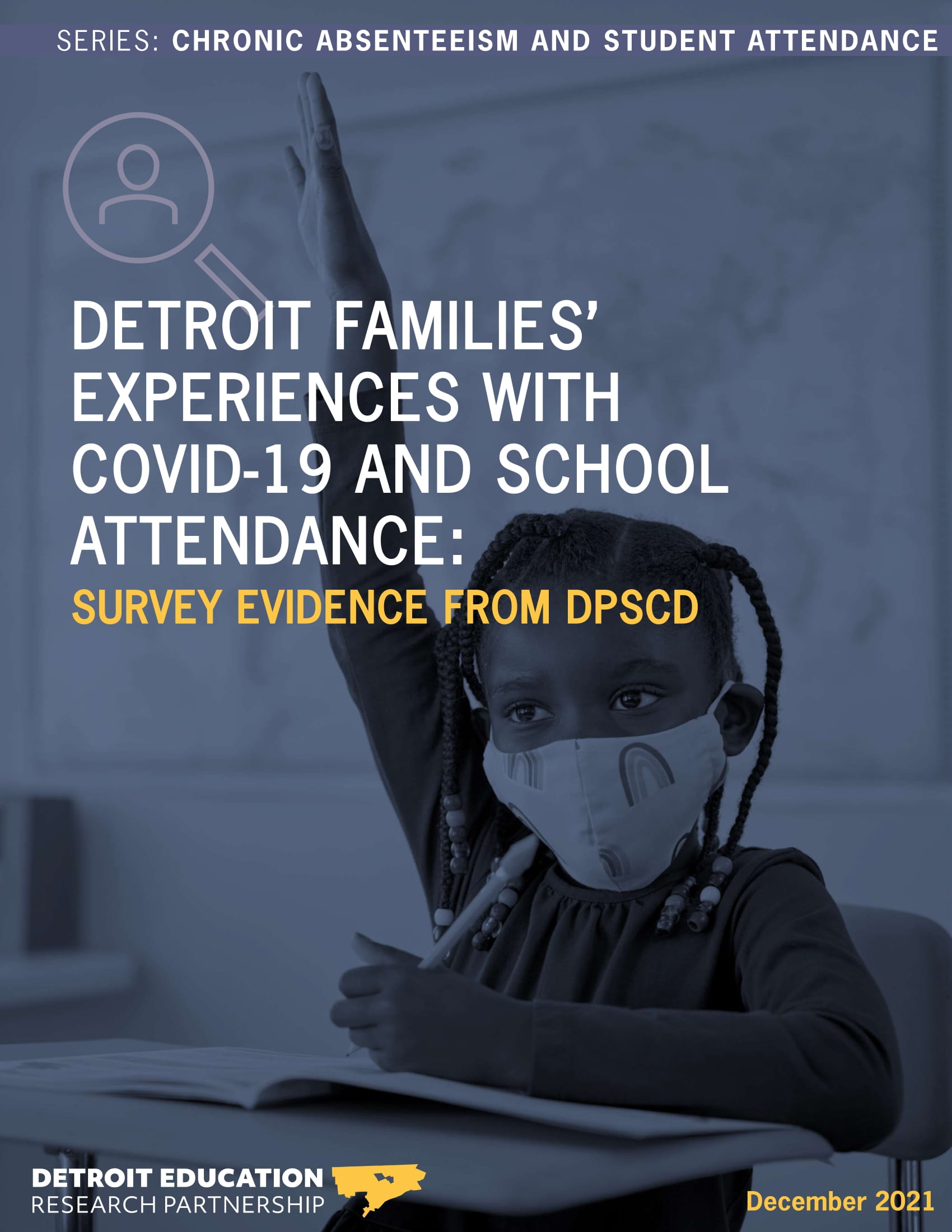
School Climate and Student Mobility
School choice has been accompanied by an increase in student mobility. Although changing schools can benefit students, research has shown that it is often associated with negative student and school outcomes. This study sought to better understand the relationship between school climate and the likelihood of student mobility across K-8 schools in Detroit, a city marked by a high level of school choice options. We found conflicting evidence of a relationship between measures of school climate as measured by the 5Essentials survey and student mobility. We discuss these findings in the context of potential sector differences, which may overshadow parental preferences for organizational characteristics.
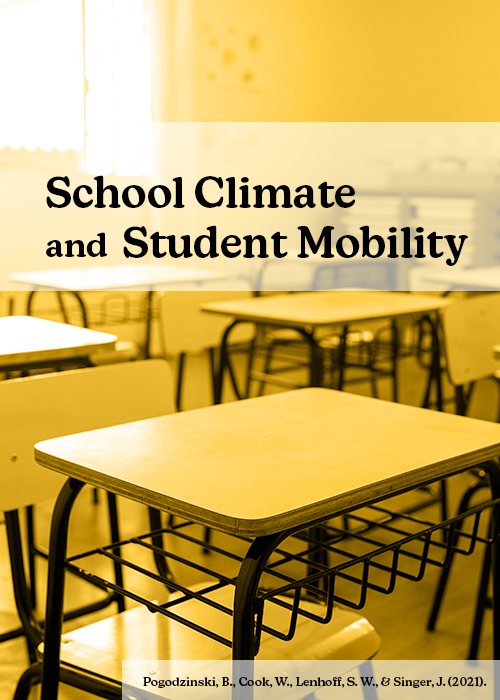
The Potential for Improvement Science and Research Partnerships to Maximize the Policy Relevance of School Improvement Research
Increased demands by policymakers for evidence-based practices and rigorous impact evaluations in education offer researchers an unprecedented opportunity to influence policy. Yet, academic research has an infamous reputation for not addressing the real problems of policy and practice, being difficult to understand, and being slow to adapt to changing circumstances in implementation. The increasing complexity of the educational policy landscape threatens to exacerbate the disconnect between researchers and policymakers. Researchers interested in school improvement cannot be content to describe and critique these processes. This book chapter describes our approach to policy-engaged research partnerships and the role of improvement science in internal and external work processes.
